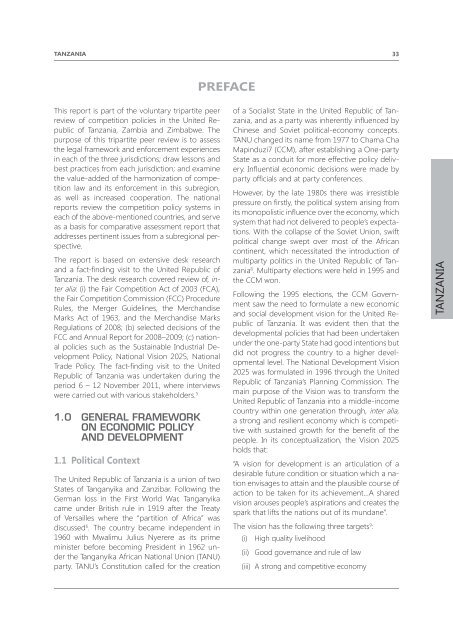a tripartite report - Unctad
a tripartite report - Unctad
a tripartite report - Unctad
Create successful ePaper yourself
Turn your PDF publications into a flip-book with our unique Google optimized e-Paper software.
TANZANIA<br />
This <strong>report</strong> is part of the voluntary <strong>tripartite</strong> peer<br />
review of competition policies in the United Republic<br />
of Tanzania, Zambia and Zimbabwe. The<br />
purpose of this <strong>tripartite</strong> peer review is to assess<br />
the legal framework and enforcement experiences<br />
in each of the three jurisdictions; draw lessons and<br />
best practices from each jurisdiction; and examine<br />
the value-added of the harmonization of competition<br />
law and its enforcement in this subregion,<br />
as well as increased cooperation. The national<br />
<strong>report</strong>s review the competition policy systems in<br />
each of the above-mentioned countries, and serve<br />
as a basis for comparative assessment <strong>report</strong> that<br />
addresses pertinent issues from a subregional perspective.<br />
The <strong>report</strong> is based on extensive desk research<br />
<br />
Tanzania. The desk research covered review of, inter<br />
alia: (i) the Fair Competition Act of 2003 (FCA),<br />
the Fair Competition Commission (FCC) Procedure<br />
Rules, the Merger Guidelines, the Merchandise<br />
Marks Act of 1963, and the Merchandise Marks<br />
Regulations of 2008; (b) selected decisions of the<br />
FCC and Annual Report for 2008–2009; (c) national<br />
policies such as the Sustainable Industrial Development<br />
Policy, National Vision 2025, National<br />
<br />
Republic of Tanzania was undertaken during the<br />
period 6 – 12 November 2011, where interviews<br />
were carried out with various stakeholders. 5<br />
1.0 GENERAL FRAMEWORK<br />
ON ECONOMIC POLICY<br />
AND DEVELOPMENT<br />
1.1 Political Context<br />
The United Republic of Tanzania is a union of two<br />
States of Tanganyika and Zanzibar. Following the<br />
German loss in the First World War, Tanganyika<br />
came under British rule in 1919 after the Treaty<br />
of Versailles where the “partition of Africa” was<br />
discussed 6 . The country became independent in<br />
1960 with Mwalimu Julius Nyerere as its prime<br />
minister before becoming President in 1962 under<br />
the Tanganyika African National Union (TANU)<br />
party. TANU’s Constitution called for the creation<br />
PREFACE<br />
33<br />
of a Socialist State in the United Republic of Tan-<br />
<br />
Chinese and Soviet political-economy concepts.<br />
TANU changed its name from 1977 to Chama Cha<br />
Mapinduzi7 (CCM), after establishing a One-party<br />
State as a conduit for more effective policy deliv-<br />
<br />
<br />
However, by the late 1980s there was irresistible<br />
<br />
<br />
system that had not delivered to people’s expectations.<br />
With the collapse of the Soviet Union, swift<br />
political change swept over most of the African<br />
continent, which necessitated the introduction of<br />
multiparty politics in the United Republic of Tanzania<br />
8 . Multiparty elections were held in 1995 and<br />
the CCM won.<br />
Following the 1995 elections, the CCM Government<br />
saw the need to formulate a new economic<br />
and social development vision for the United Republic<br />
of Tanzania. It was evident then that the<br />
developmental policies that had been undertaken<br />
under the one-party State had good intentions but<br />
did not progress the country to a higher developmental<br />
level. The National Development Vision<br />
2025 was formulated in 1996 through the United<br />
Republic of Tanzania’s Planning Commission. The<br />
main purpose of the Vision was to transform the<br />
United Republic of Tanzania into a middle-income<br />
country within one generation through, inter alia,<br />
a strong and resilient economy which is competi-<br />
<br />
people. In its conceptualization, the Vision 2025<br />
holds that:<br />
“A vision for development is an articulation of a<br />
desirable future condition or situation which a nation<br />
envisages to attain and the plausible course of<br />
action to be taken for its achievement…A shared<br />
vision arouses people’s aspirations and creates the<br />
spark that lifts the nations out of its mundane”.<br />
The vision has the following three targets9 :<br />
(i) High quality livelihood<br />
(ii) Good governance and rule of law<br />
(iii) A strong and competitive economy<br />
TANZANIA

















